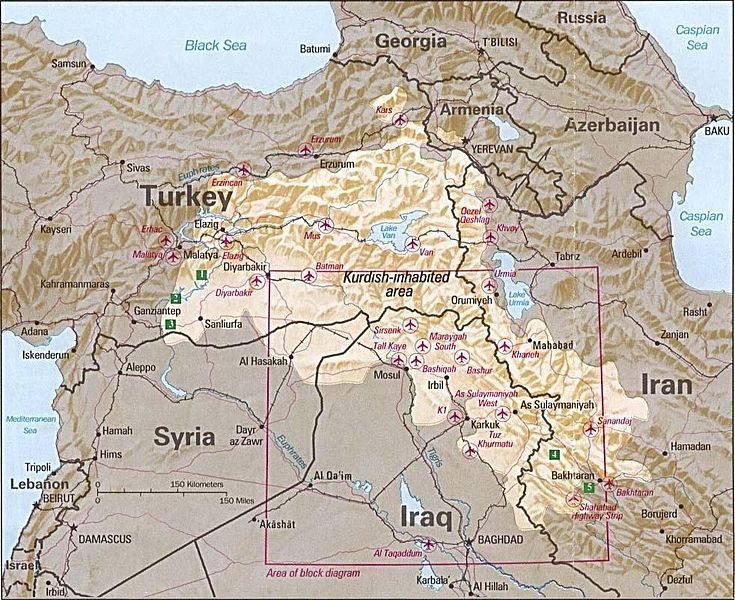 Commentary
CommentaryJURIST Contributing Editor Michael Kelly of Creighton University School of Law makes the historical legal case for a change in US policy on Kurdistan …
Having existed through millennia of foreign dominance and occupation, hard by the Zargos mountains, Kurds have a saying older than our country. “The Kurd has no friend but the mountain.” Now is the time for Washington to change its policy of a unified Iraq and support Kurdish independence. Now is the time to show the Kurds they have a friend who will stand with them. Military operations by the US in northern Iraq have begun that could pave the way for this long-delayed eventuality.
US airstrikes against ISIS and air drops for trapped Yazidi and Christian minorities in northern Iraq are legal under the 1948 Genocide Convention [PDF], which obligates member states to prevent and punish genocide. US military actions to protect these minority groups are in furtherance of the “prevent genocide” prong of that multilateral treaty. According to UN estimates, over 200,000 members of these groups are now fleeing into Iraqi Kurdistan as ISIS advances on Erbil, the Kurdish capital city, under threat of death by ISIS forces. Many of those minority groups are also ethnically Kurdish. By extension, these airstrikes also protect Iraqi Kurdistan as the safe haven for those groups.
The US has a long-standing obligation to protect the Kurds, and it will not allow the Kurdish capital to fall to ISIS. Ever since the US encouraged the Kurdish uprising of 1991, but then failed to support it as Saddam savagely crushed the Kurds, American foreign policy has been geared to protect Iraq’s Kurds. Consequently, despite this betrayal, the Kurdish government and people are the most ardent supporters of the US in the Middle East outside Israel. Yet the Kurds continue to exist under the control of other states; such has been their collective political fate for almost a century.
It is time for the US and the international community to make good on a 95-year old promise that the Kurds have their own state. Like the Armenians, the Kurds were promised a homeland in the aftermath of World War I. Upon the collapse of the Ottoman Empire, the Allied Powers outlined an independent state for the Kurds in 1920 through the Treaty of Sevres. However, the rise of Ataturk during the ensuing Turkish War of Independence and his alliance with Lenin spelled the end of independence for both the Armenians and the Kurds. Not wanting another conflict, Britain and France replaced the Treaty of Sevres with the Treaty of Lausanne in 1923, dividing the Kurdish population outside Persia among the new states of Syria, Iraq and Turkey. The US was not a party to either peace settlement as America was never technically at war with the Ottomans during the First World War.
A population of 30 million spread over an area the size of France, Kurds were victims of this legal double-cross and still do not have a country of their own. The Kurds of northern Iraq have functionally been a state since the US established a “no-fly” zone over their territory to exclude Saddam Hussein’s forces from massacring them after 1991. While a de facto state with an independently functioning government, economy, border control, military and educational and healthcare system, the Kurds remain formally part of the Iraqi federation. Since the 2003 invasion of Iraq, US policy has favored a unified Iraqi state with a federal power-sharing structure; not independence for Kurdistan. The time has come to abandon this outmoded idea. Facts on the ground have dramatically shifted and American foreign policy on Iraq must catch up to this new reality. The Shiite dominated Maliki government in Baghdad has collapsed and Iraq is reforming itself into a new configuration. Washington needs to be ahead of this reformation, not behind it trying to support the preservation of what is quickly becoming a failed state.

Located in the mountainous convergence of Iran, Turkey, Syria and Iraq, an independent Kurdistan would be a strategically important platform for US foreign diplomatic and defense policy in the Middle East and would establish a new player in the region on the international stage that could alter the formula in favor of stability in the Middle East. Last month, the Israeli Prime Minister called for the establishment of an independent Kurdish state. Israel and Kurdistan are natural allies against various combinations of Arab Sunni and Shiite factions that have long been arrayed against them. Kurdistan has recently begun shipping petroleum through a pipeline out of Turkey from the reserves it controls, and Israel has received four of these shipments. American diplomatic efforts would only benefit from the addition of Kurdistan to the ranks of Israel and Turkey as its most dependable allies there.
That said, territorial guarantees must be made reassuring Turkey and Iran that the Kurdish areas in those states would not join a newly independent Kurdistan. Turkey and Iran have traditionally been opposed to a Kurdish state carved out of northern Iraq for fear of losing the Kurdish parts of their own territories. Yet both have developed lucrative cross-border trade relationships during the past 20 years with Iraqi Kurdistan and have come to view the area as stable and reliable. Syria has also opposed an independent Kurdistan for the same reasons, but that is irrelevant at this point. Almost as irrelevant as the current American policy on Iraq is becoming.
Michael J. Kelly is Associate Dean and Professor of Law at Creighton University School of Law. He has consulted with the Kurdish government on their constitution and is the author of the book “Ghosts of Halabja: Saddam Hussein & the Kurdish Genocide”
Suggested Citation: Michael Kelly, Kurdistan: Time to Make Good on a 95-Year Old Promise, JURIST – Forum, August 15, 2014, http://jurist.org/forum/2014/08/michael-kelly-kurdistan-promise.
This article was prepared for publication by Alex Ferraro, JURIST’s Managing Editor. Please direct any questions or comments to him at academiccommentary@jurist.org

